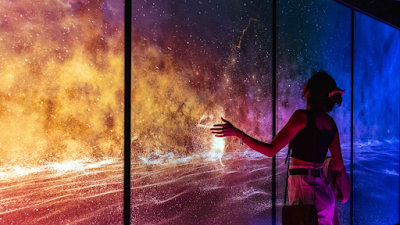But the fun and frolic don't have have to stop when the world fair ends on March 31.
Saudi Arabia Pavilion Long after Expo 2020 Dubai concludes, visitors can still walk through the sprawling site and enjoy some of the stunning architectural marvels that wooed the world.
In fact, 80 per cent of the site will remain intact and the exhibition site will be transformed into a futuristic '15-minute' city called District 2020 with office spaces, residential buildings, parks, exhibition spaces and offices.
Here are the 10 major landmarks that will stay long after the Expo officially ends.
Al Wasl Dome
The 360-degree translucent Al Wasl Dome, known as the beating heart and crown jewel of Expo, is undoubtedly the biggest Expo landmark that will remain intact.
Al Wasl, meaning ‘connection’, in Dubai - with its steel trellis and distinctive geometry - is based on a recently discovered 4000-year-old Bronze Age ring.
The Dome that hosted some of the world class performances such a s Coldplay will continue to be a gathering space where concerts will be held. Designed by Adrian Smith + Gordon Gill, the Dome is taller than the Leaning Tower of Pisa. At night, the Dome becomes an artwork with the world’s largest projection experience.
Terra – The Sustainability Pavilion
The net-zero energy pavilion, which was one of the first attractions that opened to the public even before the Expo 2020 officially launched on October 1, will stay post Expo.
Designed by UK-based Grimshaw Architects, the pavilion has a giant solar-powered canopy that can collect stormwater and dew that replenishes the building’s water system.
The pavilion that has a self-contained micro ecosystem will become a children’s science centre and will continue to inspire people to adopt sustainable practices. It will host workshops and serve as temporary exhibition spaces to raise awareness about the environment and to inspire children to make changes in their everyday life.
The Mobility Pavilion, Alif
The Mobility Pavilion, named after the first Arabic alphabet, has attracted millions of visitors with its unique, ribbed and curved structure, will remain at the site.
Designed by Foster and Partners, the luminous structure showcases cutting edge technologies that human have used to advance.
The pavilion features the world’s largest passenger lift that carry more than 160 people, and a partly open air 330-metre track that allows visitors to see the future of mobility. After the Expo, the pavilion will host exhibitions.
Dubai Exhibition Centre
Located adjacent to the Dubai Metro Route 2020 station, the Dubai Exhibition Centre can be called the business and networking hub of Expo.
The sprawling 45,000 square metre exhibition space will remain as a world-class facility to host conferences, concerts and exhibitions post Expo.
Gravity-defying water feature
One of the biggest crowd-pullers at the Expo, the gravity defying water feature will also remain as a legacy.
The water feature combines three elements of nature – water, fire and earth – to give visitors a surreal experience of water flowing upwards before it tumbles down 13-metre-high vertical walls, that cascades into a mysterious, multi-hued circle of fire.
The orchestra score that adds to the experience is created by Ramin Djawadi, the Game of Thrones music composer and two-time Emmy award winner.
Observation Tower
The 55-metre-tall rotating observation tower that gives a bird’s eye view of the Expo 2020 site will also remain after Expo.
The tree-lined upper deck offers sweeping views of the site while the base of the tower and the observation cabins glow at night as visitors are lifted into the sky.
The tower is designed by London-based architect Asif Khan who is behind the three carbon-fibre Expo gates.
The UAE Pavilion
The second largest pavilion is the Saudi Arabia Pavilion, which stands tall as a giant window open to the sky reflecting the Kingdom’s past, present and future.
The pavilion that features a gigantic LED mirror screen, interactive water feature and covers an area of two soccer fields, takes visitors on a journey through the flora, fauna, the beautiful coasts, and high mountains of the country.
India Pavilion
Nestled at the Al Forsan Park adjacent to the ‘Opportunity’ district of the Expo 2020 Dubai, India Pavilion is one of the largest pavilions at the Expo 2020 Dubai and symbolizes ‘India on the move’.
Made up of 600 individual blocks, the facade uses kinetic architecture - a mosaic of rotating panels that showcase stories about the history, and literature of the country.
Consisting of four floors, the pavilion will remain as an educational and cultural space and will promote innovation.
Firdaus Orchestra Studio
The Firdaus Studio located at the Expo site is the brainchild of Oscar-winning musician AR Rahman.
It is the home for the all-women ensemble he mentored to perform at Expo.
The studio will remain as a world-class creative space for artists and composers from around the world to collaborate.
The studio aims to attract world class talent and promote local musicians and artists.
The second largest pavilion is the Saudi Arabia Pavilion, which stands tall as a giant window open to the sky reflecting the Kingdom’s past, present and future.
The pavilion that features a gigantic
Culled From Khaleej Times.
LED mirror screen, interactive water feature and covers an area of two soccer fields, takes visitors on a journey through the flora, fauna, the beautiful coasts, and high mountains of the country.











Good to know!!!!
ReplyDeleteNICE ONE
ReplyDelete